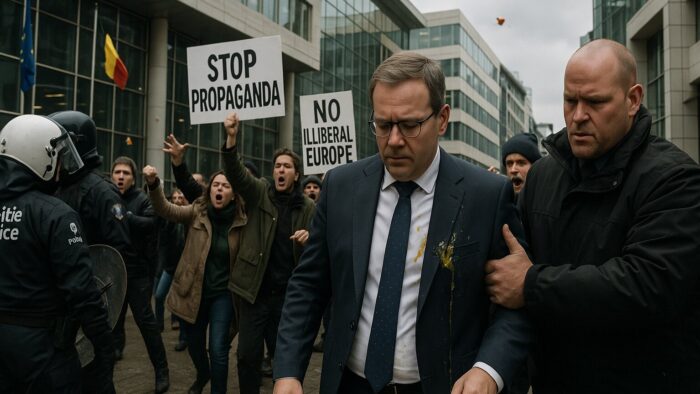In Hungary, critics of Orban are facing unprecedented restrictions as the ruling Fidesz party proposes legislation that could fundamentally alter press freedom and political opposition. On 17 May 2025, Deutsche Welle reported that Prime Minister Viktor Orban’s government presented a draft “transparency of public life” law that would allow authorities to monitor, restrict, penalize, and potentially ban organizations deemed threats to national sovereignty. The legislation targets journalists, political opponents, NGOs, and media outlets receiving any foreign funding.
The article begins:
“The bugs have overwintered,” Viktor Orban said earlier this year, referring to journalists, political opponents and his critics. “We will dismantle the financial machine that has used corrupt dollars to buy politicians, judges, journalists, pseudo-NGOs and political activists. We will eliminate the entire shadow army.” For Hungary’s populist prime minister, that time has now come. This week, Orban’s Fidesz party presented a bill that, according to The Associated Press news agency, “would allow the government to monitor, restrict, penalize and potentially ban organizations it deems a threat to national sovereignty.” Reporting the news, Hungary’s largest independent news portal Telex, which is usually rather cautious in its choice of words, wrote that Hungary had left Europe. Its report was accompanied by a graphic of a black boot sole emblazoned with the Fidesz logo, as well as that of the Russian domestic intelligence service, the FSB.
Read more: https://www.dw.com/en/hungarys-orban-plans-transparency-law-to-muzzle-critics/a‑72571703
Key Points
- The Hungarian Sovereignty Protection Office would gain power to classify any organization receiving foreign support, including EU funding or even books from abroad
- Organizations listed in a special register would lose access to the 1% income tax donation rule and face heavy fines or bans for receiving foreign funds
- Opposition leader Peter Magyar called the bill “another step on the Putin path” while Budapest Mayor compared Hungary’s trajectory to Russia
- Government spokesperson Zoltan Kovacs justified the law as necessary to combat “pro-war and pro-Ukrainian propaganda” from foreign-funded media and NGOs
Orban and the Global National Conservative Alliance: Transatlantic Networks, and the Rise of Illiberalism
Viktor Orbán has positioned Hungary at the forefront of the Global National Conservative Alliance (GNCA), leveraging institutions like the Mathias Corvinus Collegium (MCC) to build transatlantic networks that unite US conservatives and European nationalists around an “illiberal” agenda. The MCC, described as Orbán’s elite factory, receives massive state funding and serves as a hub for right-wing intellectuals, hosting events and partnerships that reinforce Hungary’s model as a blueprint for the global right. This strategy is visible in the deepening political alliance between Orbán and American conservatives, with figures like Tucker Carlson and Peter Boghossian amplifying Hungary’s anti-liberal, anti-LGBTQ, and anti-“woke” narratives.
The expansion of MCC’s footprint in Brussels and its recruitment of Western academics underscore Orbán’s ambition to reshape European discourse and export Hungary’s illiberal model, even as critics highlight the erosion of academic freedom and democratic norms, as seen in extensive ties between US “free speech” university leaders and Orbán’s Hungary. Analysts note that these efforts not only consolidate domestic power but also facilitate Russian influence operations by amplifying national conservative themes. Orbán’s approach has inspired similar movements across Europe, contributing to the formation of new right-wing alliances in the European Parliament and challenging the liberal democratic consensus.
External reporting confirms that Hungary’s government has systematically eroded checks and balances, using educational and cultural institutions to entrench a durable conservative “deep state” and positioning Budapest as a magnet for right-wing intellectuals worldwide.
External References:
Disclaimer
The Global Influence Operations Report (GIOR) employs AI throughout the posting process, including generating summaries of news items, the introduction, key points, and often the “context” section. We recommend verifying all information before use. Additionally, images are AI-generated and intended solely for illustrative purposes. While they represent the events or individuals discussed, they should not be interpreted as real-world photography.









